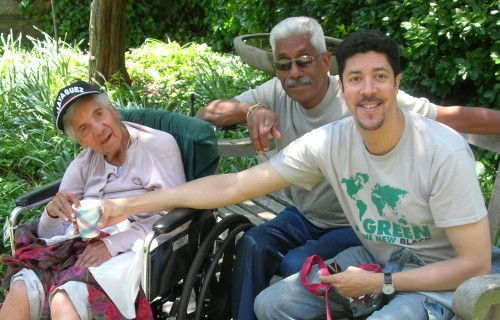Useful Links

Three Generations
(Photo courtesy of John H)
Here are clickable links that
LiLY
finds useful,
arranged alphabetically:
-
Aging and Disability Resource Center Program
(commonly abbreviated as ADRC) is a collaborative effort of the U.S. Administration on Community Living and the Centers for Medicare & Medicaid Services (CMS). It provides “one-stop shop”, or “no wrong door”, sources of information, one-on-one counseling, and streamlined access to programs and services that can enable people to remain in their own homes and communities.-
ACL/CIP Aging & Disability Resource Centers Program
points to the web page of ADRC of the Administration of Community Living (ACL) Center for Integrated Programs (CIP). -
Affordable Care Act – Aging and Disability Resource Center
points to the Affordable Care Act web page part of the Affordable Care Act in theCatalog of Federal Domestic Assistance. -
Aging and Disability Resource Centers (ADRCs)
points to the National Health Policy Forum Background Paper No. 81 Aging and Disability Resource Centers (ADRCs): Federal and State Efforts to Guide Consumers Through the Long-Term Services and Supports Maze .
-
ACL/CIP Aging & Disability Resource Centers Program
-
Eden Alternatives
promotes a new, humanist approach to elder living. -
The Green House Project
creates a small intentional community for a group of elders and staff, focusing on life. Its heart exists in the relationships that flourish there.-
ChangingAging.org
is a blog by Dr. Bill Thomas serving as a platform to challenge conventional attitudes towards aging and to provide positive, growth-oriented alternatives for a life worth living.
-
ChangingAging.org
-
Health Care For All New York
is a statewide coalition dedicated to establishing affordable, comprehensive, and high quality health care for all. -
The International Longevity Centre Global Alliance – USA
has the mission to translate interdisciplinary scientific knowledge on the aging process and its implications for societies into sustainable policy-focused practice to maximize productivity, quality of life, and health across the life course.-
Draft United Nations Declaration
on the Rights of Older Persons
was prepared by the Allard K. Lowenstein of the International Human Rights Clinic at Yale Law School with the International Longevity Center.
-
Draft United Nations Declaration
-
LinkedIn Group, S.O.S. Support Our Seniors
establishes the LiLY presence in LinkedIn, a professionally oriented social networking group. -
Metro New York Health Care for All Campaign
is a citywide multi-constituency health care justice coalition. -
Newspaper articles about
the Morningside Village of LiLY-
Columbia Spectator, Monday 28 September 2009,
“Local residents reach out to elders”
by Sam Levin. -
Columbia Spectator, Tuesday 2 February 2010,
“Morningside Village helps elderly age at home”
by Ray Katz and Sonal Kumar.
-
Columbia Spectator, Monday 28 September 2009,
-
Our Mother’s Voice
includes this paragraph from the mission statement on its web site:Our Mother’s Voice provides information to families of nursing home residents to empower and equip them to advocate for quality of life and quality of care which goes beyond traditional custodial care to encompass the achievement of maximum physical, spiritual, social, mental, and emotional health for each resident.
The wonderful spirit motivating this organization is described by this excerpt from the same web page:Our mother is a lifelong activist for social justice for those without a voice. Dementia has taken her ability to talk, and she now finds herself a member of a group without a voice: nursing home residents who cannot speak for themselves when something is not right. Her non-verbal communication with us, her daughters, was very clear to us, however; and called us into action, to advocate for this group without a voice, to carry Our Mother’s Voice.
-
Dealing With Geriatric Shame
starts with these three paragraphs:As coordinators of a volunteer-based eldercare “village” in New York City, we have observed real-life manifestations of an array of shame that is particular to elders—and sometimes, sadly, with tragic consequences. At least one of our older patients was too ashamed to reach out. Shame, coupled with its consequences of concealment, isolation, and health challenges, began a downward spiral that led to the suicide of one nonagenarian.
Aside from the ordinary kinds of shame people may feel–for example, the shame of needing to borrow the rent or mortgage money–we have witnessed a special geriatric shame in its manifold forms when it comes to growing old in today’s culture. Geriatric shame, we propose, is the result of specific feelings: shame at appearing old, shame at needing help, shame at feeling useless or purposeless, shame at being lonely, and perhaps shame at one’s failures at living. To this group, other shames can be added–for example, when a middle-class individual must, in old age, live very frugally because of reduced income, or when someone can no longer clean his or her apartment and is ashamed of his or her home.
These observations have informed our work with seniors–and transformed it. We, in our leadership roles of Morningside Village, aim to decrease shame, avoid causing additional shame, and help elderly community members enjoy the benefits of age in their own homes wherever possible.
